Text, links and media posted online can be persistent. Even when you WANT to remove something posted online from later public scrutiny, content can “live on” for a variety of reasons. Vicki Davis’ post today, “Facebook Photos: Your Delete Doesn’t Mean “Delete”” is a reminder of this in the social networking sphere. In this post I’ll share how this can also be true in the blogosphere.
On October 1, 2010, NPR featured the rather incredible and distressing story, “Michigan Official Off Job After Targeting Gay Student.” I heard this recently because I subscribe to the wonderful NPR Technology Podcast. Michigan Assistant Attorney General Andrew Shirvell is facing consequences for his apparent stalking and persecution (both online and in person) of Chris Armstrong. Armstrong is the current student body president at the University of Michigan. Shirvell created the blog “Chris Armstrong Watch” (chris-armstrong-watch.blogspot.com) and has recently made the site password-protected to take it off the “public web.” Part of the controversy, according to the NPR news piece, was the earlier claim of Shirvell’s boss (Michigan attorney general Mike Cox) that Shirvell’s behavior was outside his control since it was political speech protected by the first amendment, and Shirvell was doing these controversial activities (including blogging) on his own time. The fact that Shirvell has made his Blogger blog private suggests the content there is not accessible publicly any longer. Because of available “web caching” technologies however, that’s not the case.
The Internet Archive’s Wayback Machine is a site which creates periodic copies, or “caches,” of websites which can be used to compare how the design and content of a specific website has changed over time. One of my personal websites, www.wesfryer.com, has a variety of cached versions on the WayBack Machine going back to 2002.
When a visitor tries to view cached versions of “Chris Armstrong Watch” on the Wayback Machine, however, they are not available. Google has added a “robots.txt” file to blogger sites (apparently) which includes a digital instruction NOT to make automated site copies.
The content on Shirvell’s blog site about Armstrong appears to be hidden, right? Think again. When you search Google for “chris-armstrong-watch.blogspot.com” the option to view a cached version of the website is visible right underneath the link.
This specific cached version of the site’s homepage was copied on “Sep 16, 2010 23:38:44 GMT.”
Be aware the content we share online can be persistent, even when someone takes active steps to try and REMOVE it from the public web. Many issues are certainly raised by this Shirvell / Armstrong situation. A bit more background is available on the current revision of the WikiPedia entry for Shirvell on Mike Cox’s WikiPedia page. The WikiPedia “talk page” for Cox’s page is interesting, as it reveals the debates between different WikiPedians about content to include or exclude from a living person’s page, pages that reference living persons, and pages about controversial topics. The Wikipedia:Biographies of living persons page gives more background. I like the “in a nutshell” summary:
Material about living persons must be written with the greatest care and attention to verifiability, neutrality, and avoiding original research.
We often hear adults bad-mouth WikiPedia, but in some cases those individuals may not understand the struggles which take place among WikiPedia editors to support these goals of writing verifiable and neutral articles. As Philip Cummings clearly communicated in his outstanding #micon presentation a couple weeks ago, “Say Yes to WikiPedia,” there is a GREAT deal we call can learn from the experience of working on a WikiPedia article editing project. The frequent persistence of online content is one of those lessons. This persistence can be both good and bad in different contexts. We should think of this not only in legal contexts, but also in instructional contexts like electronic portfolios for student work. Once it’s been published publicly, it may be “out there” for others to find and view for a long time. In my view, this absolutely should NOT dissuade us from publicly sharing and publishing as Dean Shareski eloquently pointed out for his opening 2010 K-12 Online Conference this week.
Technorati Tags:
cache, google, npr, post, web, persistent, shirvell, armstrong, michigan, gay, wayback
If you enjoyed this post and found it useful, subscribe to Wes’ free newsletter. Check out Wes’ video tutorial library, “Playing with Media.” Information about more ways to learn with Dr. Wesley Fryer are available on wesfryer.com/after.
On this day..
- Rediscovering 10 Year Old Deleted Podcast Files – 2021
- Beware of Genieo Adware on Apple Computers – 2013
- Share Your Ideas for K-12 Online 2011: Purposeful Play – 2011
- Construction Engineers and Concrete Masons can save MILLIONS of lives (Haiti earthquake story) – 2010
- Remote Control iPad Presentations #edapp – 2010
- Again, U.S. federal funds used to strong arm state legislators – 2009
- The Maine Department of Tourism is Taking Care of Travelers – 2009
- Lunch with Clay Shirkey and Alan Kay – 2008
- Obama on Flickr and Validating Information Sources – 2007
- Seize the moment and make the most of NOW – 2007

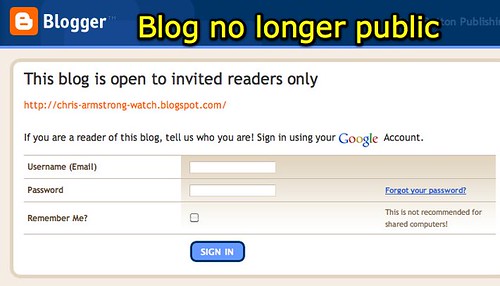
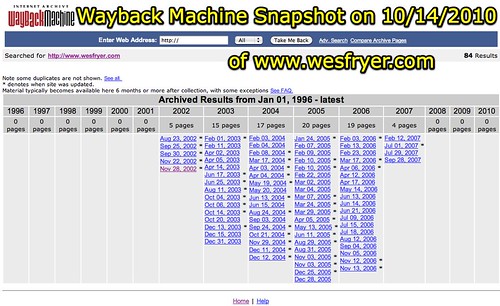
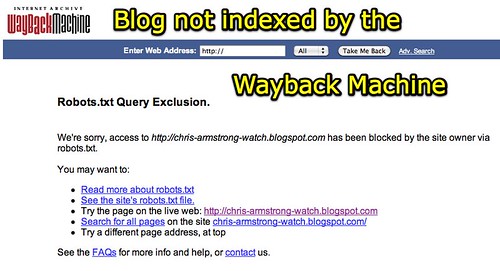
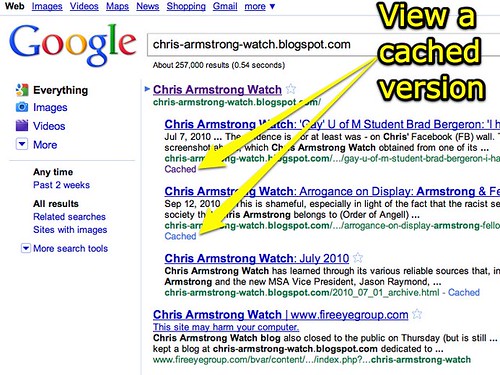
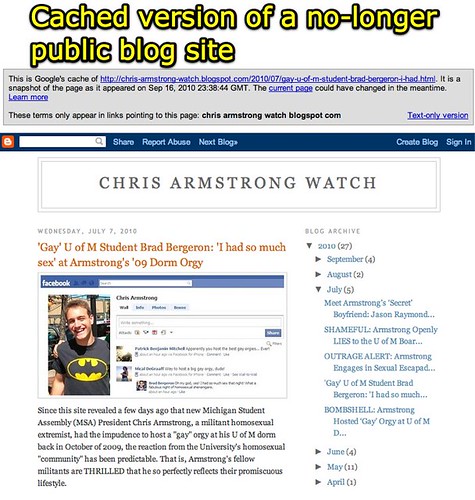
Comments
3 responses to “Online Content Can Be Persistent (even when people try to take it offline)”
Wes, I just have to say that this is one of the most well written and demonstrated examples of the persistence of online content that I’ve seen in a long time. It is a great contribution to the Internet and blogosphere and is a case study that is appropriate for use at many levels. Thank you for taking the incredible amount of time this must have taken to research.
I also think this is appropriate as it is national bullying prevention month and many of these behaviors do border on the realm of cyberbullying.
Thanks Vicki. Good points about this situation raising cyberbullying issues… And this is an adult, too.
Enjoy ACTEM! They have a great team up there and super educators to learn with!
It was nice to see today that Shirvell finally got fired. Should have happened months ago. What a creepy, sick little man he is.